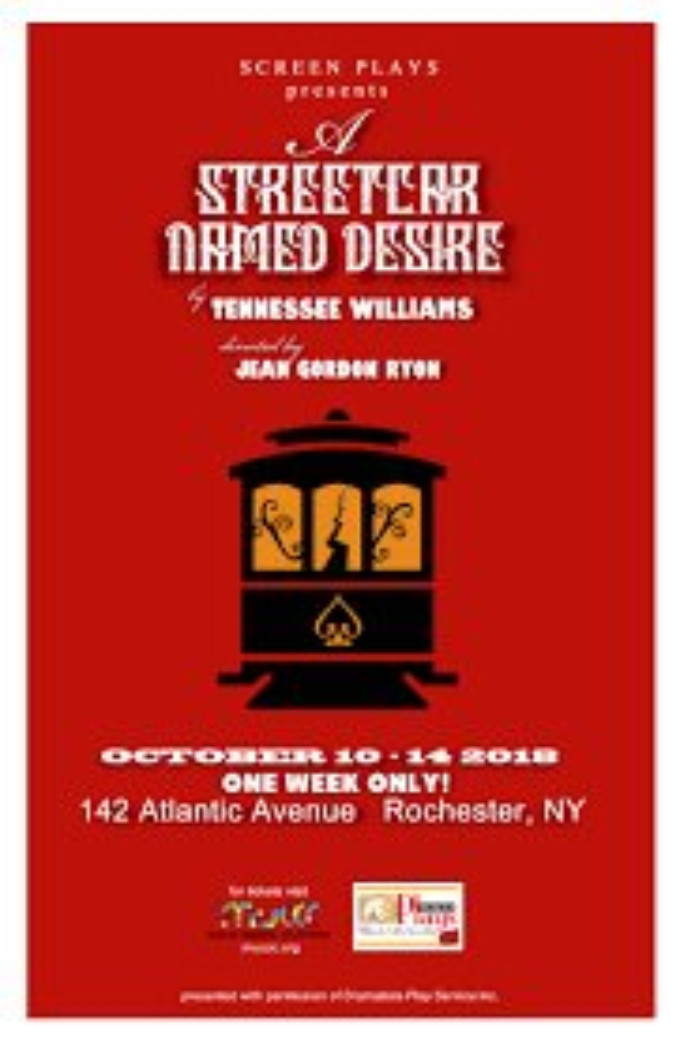Review: A STREETCAR NAMED DESIRE at MuCCC

Screen Plays, a unique gem within the Rochester theatre community, has brought to life one of the most iconic and ambitious works of the American theatre repertoire. Its famously heavy themes make it tough for any local theatre troupe to tackle, but the production currently playing at Rochester's Multi-Use Community Cultural Center (MuCCC) is dynamic, well-staged, and impressively acted.
Set in the French Quarter of New Orleans during the restless years following WWII, A Streetcar Named Desire is the story of Blanche DuBois (Laura Woodruff), a fragile and neurotic woman on a desperate prowl for someplace in the world to call her own. She shows up on the doorstep of her sister Stella (Megan Bell) and her violent and rough-around-the-edges husband Stanley (Adam Petzold), looking for a place to stay for the summer. Blanche's flirtatious Southern-belle presence causes problems for Stella and Stanley, who already have a volatile relationship, leading to even greater conflict in the Kowalski household. Though Stanley and Stella both play prominent roles in the story, Streetcar is largely an examination of Blanche; her unraveling, what caused it, and how she moves forward in the world in spite of it.
Director Jean Gordon Ryon and Set Designer Ken Dauer made excellent use of the MuCCC's space. It is no easy feat to adequately stage a cramped apartment, outside street, and upstairs neighbors within an intimate theatre setting, but the environment that they created breathed when it needed to and shrank when appropriate.
Screen Plays' production is well acted by the whole cast, though the standout performances come from D. Scott Adams-portraying Mitch, Blanche's brief love interest-and Laura Woodruff playing Blanche. Blanche is without a doubt one of the densest and most complex female characters in theatre, requiring the actress who portrays her to exude the trappings of a flowery southern belle while also surfacing the character's scarring past, dishonesty, and truly delusional nature. Woodruff does a masterful job.
Much has been written about how this show has aged, and the difficulty of viewing it through a modern lens as an audience member. After all, one of the three main characters spends the sweeping majority of his time on stage terrorizing women. My experience watching it as a critic was an equally mixed bag. Streetcar is, for many reasons, one of the most important dramatic works of the 20th century: its portrayal of the post-WWII American south, its themes of masculinity vs. femininity, sexuality and socioeconomic class to name a few. I had never seen a staged version and it had been years since I'd seen the movie, so I quixotically approached my viewing of Screen Plays' production of Streetcar with those themes in mind, not giving much forethought to the story's more troubling aspects (though I did remember that Stanley Kowalski was an objectively terrible human being). I quickly remembered that, in addition to the gripping sociological and psychological themes that make it a fascinating play there's also ample violence, rape, gender hierarchy, and a general glorification of Stanley's toxic masculinity.
To be clear, none of this is a negative reflection on Screen Plays' production. It really is a great interpretation, and the cast does a fantastic job. The troubling aspects of the show have been present since it was first written and staged in 1947, long before it graced the MuCCC stage. I guess it raises the question that's been popping up a lot in the #metoo era: should we continue lionizing plays such as Streetcar that portray terrible treatment of women, in spite of their other praiseworthy or interesting themes? Did playwright Tennessee Williams craft the story in this way PRECISELY to criticize female oppressiveness, or was the mistreatment a byproduct? The 2018 Broadway season saw revivals of Carousel and My Fair Lady, both of which got a fair amount of blowback for their misogyny. I guess it's up to the individual audience member to decide what the place is of shows like A Streetcar Names Desire in our culture. It's a thorny, confusing question, and as Blanche says, "there's so much confusion in the world." But Screen Plays does an excellent job at bringing this story to life, and their production is a worthy one in which to go and wrestle with these questions.
Screen Plays' production of A Streetcar Named Desire plays until October 14th at the MuCCC. For tickets and more information, click here.
Reader Reviews

Videos
